|
Morning Dew Farm, Newcastle, Maine
Brady Hatch and Brendan McQuillen as experienced by Ben
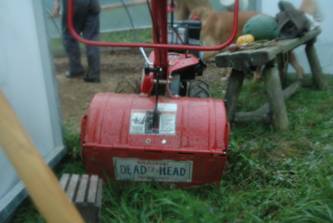
“Maxwell, Out. Out. I said out!” Brady forewarns,
in a tone that makes it seem like she’s used to repeating. She
puts her rake down, brushes the blonde hair out of her face and walks
over to her rambunctious dog. Maxwell looks up, wags his tail
feverishly, and remains standing in the same spot. Brady and I have
just laid spinach seed and Maxwell, an overly friendly golden retriever,
is doing his best to mix up the well-groomed soil. His company
is always appreciated, just not always completely helpful when work
needs to be done at Morning Dew Farm.
------------------------------------
Farmers wake up early. More often than not, they beat the sun out
of bed. The customary depiction of America’s farmer is
a man in his fifties with weathered face and hands and a rock-solid
work ethic fortified mostly by time. America’s farmer
is out riding his plow wearing a sun-washed red O’Malley’s
Propane hat and a patched-up faded denim shirt. His old beagle
Jake, when not off chasing geese, is running along his side. I
couldn’t tell you exactly where this farmer is, but he’s
probably somewhere landlocked in the plains of America’s Heartland,
far away from the ocean. After meeting Brady Hatch and Brendan
McQuillen though, this stereotypical image was refocused.
-----------------------------------
I wake up around 8 am in the RV. The sun has been shining for
an hour or so now. Barefoot and in only boxers, I scamper on the
gravel driveway of 149 Cottage Point Road. I’m doing my best
to avoid any damage to the soft underside of my foot. To the squirrels
waking up in the pines above, it probably looks like I’m walking
on hot coals or doing some sort of elaborate rain dance. I
finally reach the welcoming door of Adam’s gray house that
from the Damariscotta River looks like a church. Feet now firmly
planted on friendly ground, I am in awe of the Native American peoples
who navigated much harsher terrain with nothing more than floppy
moccasins. I consider and conclude that they just had tough
soles. When I was younger, I had tough soles too, but they’ve
gotten softer over the years. I’m working on getting them back
though. I’m going farming.
Twenty minutes after getting dressed, Wigs and I meet Brady Hatch
and Brendan McQuillen, both 24, and Maxwell their dog, almost 1,
at Morning Dew Farm in Newcastle, Maine. Brady is a
pretty woman, petite, but with a strong jaw worthy of someone who
works with her hands. Brendan much taller, sports a beard that,
judging by its thickness, he started growing in early spring. He
is wearing a well-worn navy blue hat that has a white patch on the
front outlined in green with the words National Fishermen scripted
in blue. Brady and Brendan look like farmers to me, albeit
a little young. The couple greets me with a warm welcome, but it’s
still early enough in the morning when unnecessary chitchat is more
of a chore than anything else.
After stowing our gear (cameras, recorders, notebooks, etc.) safely
under a tarp, Brady, Brendan, Maxwell, Wigs and I walk down from
the barn to the greenhouse. The ground, wet from the last of
the dew and the now morning drizzle, feels fresh between my toes
(I know this because I forgot shoes, so I am wearing flip-flops). Once
cozily inside the greenhouse and free from the rain, Brady tells
me about the day the greenhouse was built. “We
offered a free lunch and beer to some people from town in exchange
for help. The greenhouse came in a kit, and the directions
were terrible. The wind was blowing hard and it was raining
pretty heavy, but we got it up. We learned a lot from the experience.”
Morning Dew Farm is a beautiful place, rain or shine. In addition
to the greenhouse, there is a picturesque farmhouse
with the proper shutters and shingles, a barn worn down just enough
to be authentic but not so much to be unstable, and fields of lettuce,
tomato, spinach, and leeks. I especially enjoy the wild apple trees
and the lone pear tree.
Morning Dew is not your typical farm. First, it’s only
fourteen miles from the Atlantic Ocean – coastal enough that
shellfish detritus is used in the topsoil and compost. But mostly,
Morning Dew is different from a traditional farm because it represents
a new wave of crop cultivation. Locally grown organic. Local means
crops are not shipped in from all over the world but instead grown
at local farms for use at local restaurants, groceries, and homes. Organic is
more difficult to pinpoint. It has all sorts of legal definitions,
but to simplify, it means grown and processed without chemicals and
pesticides. And one more thing, the farmers of Morning Dew
and Maine in general are younger. The average age of an American
farmer is around 55, but because of ambitious young farmers like
Brady and Brendan, the average Maine farmer is 52.
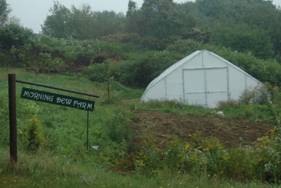
Between shoveling manure, raking topsoil, and planting arugula one
pinch of seed at a time, I get a better glimpse of what brought Brady
and Brendan here. They met their senior year in a Philosophy
of Environmental Thought class at Johns Hopkins. The class was a
blend of both of their majors: Brady, Environmental Studies, and
Brendan, Philosophy. They read and interpreted
the likes of Thoreau and Emerson. Their discussions on transcendentalism
merged into friendly conversations, and soon they were meeting after
class to grab what Brady considered lunch and Brendan breakfast. Over
these meals, they found that they had much more in common than one
class.
Originally, both had intentions of studying International Relations
and becoming suit and tie-wearing ‘big wigs.’ They wanted
to make a global impact by working for the United Nations or some
high-powered law firm but sometime before graduation, they became
disillusioned with the world of politics and academia. Brendan questioned
the point of his Political Philosophy class, “People are hungry
out there and we’re asking, ‘Is proportional representation
in Germany a more effective system than the Lord of Chambers in Britain?’ Is
it really going to the root of the questions we should be asking? For
me, it wasn’t.”
So upon graduation, they both decided to work with their hands and
find a more tangible self-fulfillment. Both apprenticed as
farmers in the Pacific Northwest and the South to learn the trade-
not the traditional post-collegiate path. According to Brendan, “Yeah,
I got shit about it. $150,000 education from Johns Hopkins
and you’re going farming. You’re wasting your time.” He
clearly doesn’t think he is. “It feels good to work hard
at the end of the day and complete a task. Growing crops and
seeing the whole process of growth is tangible.” Also,
he says his education has paid off in ways he couldn’t have
imagined. “You bring your education with you wherever you go. It
helps with direction, orientation, and everything else. It
also helped us write a 48-page business plan for the farm this past
winter.”
Farming might be more tangible than other trades, but it is no
easier. Brady notes, “People write books about how
easy it is to farm organically. You just have to do this,
this, and that. Well, I wish that were the case. It’s
hard work.” The dampness of my shirt and
the dirt underneath my nails is hard evidence that organic farming
is no walk in the park, nor is it a standard nine-to-five gig.
It has begun to rain harder now and inside the greenhouse it
sounds like we’re in the bellows of a drum that someone is
rapping with gentle fingers. It’s harder now
to have a conversation, so we concentrate on our work. We
finish the days’ work in half the time because today Morning
Dew has double the employees-four instead of two. I’ve
worked up a good sweat and quite a hunger as well, but before we
head in for lunch, we walk over to the fields on the other side
of the farm. Brendan pulls a couple of bluish-green leeks out of
the ground. “These look good,” he says. “Sure
do, what are you going to do with them?” I ask. He
laughs. “We’re going to eat them, that’s what
we do. If I grow something I want people to eat it. I’m
not saying growing huge hollow pumpkins for jack-o-lanterns isn’t
cool, but my favorite part of work is feeding people.”
Crops in hand, Brendan, Wigs, and I walk up the stairs of the porch,
through the screen door, and head for the kitchen. I try my best
to help out by washing and chopping the freshly picked vegetables,
but I’d probably be of greatest service if I stayed out of
the way. Brady puts a pot of water to boil and Brendan pulls open
the fridge and grabs four locally brewed Maine beers. He asks
if I can drink, considering I’m working and what not. I
tell him that a beer every once in awhile probably fits my job description. “Good,” he
says. “It’s a hell of a lot better than drinking that
orange stuff in the corporate cafeteria.” I couldn’t
have said it better. Beers in hand, we go to sit down. He
strums away at his banjo and I listen. The combination of the
sound of the rain outside, the banjo inside, and the aromas emanating
from the kitchen puts me at ease.
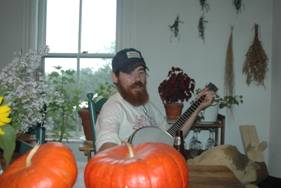
A couple of banjo licks later lunch is laid out. It consists
of hot potato and leek soup, freshly picked garden salad with sun-dried
tomato vinaigrette and grilled cheddar cheese on French bread with
tomato and basil. In between bites, we talk about what really
matters. Brendan replies, “It’s all about enjoying
the small things. I have a wonderful girlfriend and business
partner, we have Maxwell (he’s a good dog), a cool roof over
our head, a car that starts regularly (for the most part), a fulfilling
occupation, and plenty of food. It’s a simple way of life. Old
time Americana. ‘Family, it’s time to gather
round the table’ type deal. ”
Brady explains in greater depth how Morning Dew works. They
rent the property from Brady’s mom and set it up as a food
cooperative where local townspeople pay a fee and become members
for the growing season. Members are entitled to freshly grown
local groceries twice per week. Currently, there are eighteen
co-op members, but next year, they expect that number to double
to thirty-six. Morning Dew is notably different from your chain
fluorescent Supermarket: Aside from the freshness and locality
of their products, Brady and Brendan offer a new family discount
for families that have children younger than two and they offer
work-share programs where anyone can come work the farm in exchange
for crops. Their yoga instructor is a work-share farmer.
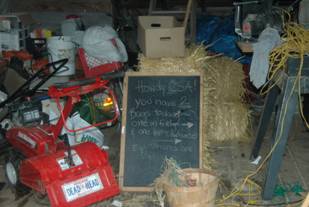
The local organic movement is gaining momentum. In fact,
supermarket chains like Whole Foods and magazines like Organic
Style are taking the old Saturday farmer’s market, bringing
them to the mainstream, and making a profit. However, not
all who jump into organic farming are doing so because of the appealing
bottom-line. Brady and Brendan are farming for more than money
or glamour. Brendan points out, “They don’t show the
picture of the farmer in the magazines. He’s never
around, because he’s too busy working. Instead they
show some woman with a Bolivian cashmere scarf. But
you know what, the magazines work though because they get the message
across. I see that woman in the scarf at the farmers market
all the time and she buys our tomatoes.”
When the couple is not working at the farm, they wait tables
at The Damariscotta River Grill. All the restaurant’s
summer salad plate specials and many of the other vegetables come
from Morning Dew. Fittingly, when the couple is not farming
or waiting tables, they like to relax by cooking. Clearly,
their lives revolve around growing and providing food.
Halfway through lunch, Brady’s Mom walks in. She
and her husband moved to this Maine property from Capitol Hill
to start a sheep farm and now, only two years out of college, her
daughter and boyfriend have carried on the farming tradition. Like
all moms who ask because they care, Brady’s mom inquires
if Brady is drinking a beer. Brady replies, “Yes, Mom,
but it’s organic.”
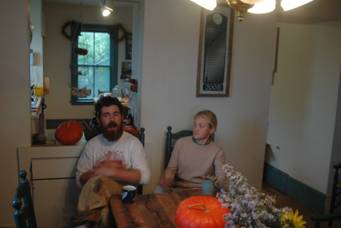
After lunch, I help to clear the table. Inadvertently,
I succumb to a stereotype. I ask Brendan if they use the dishwasher. He
replies laughing, “No, and we also churn our own butter… Yeah,
we use the washer. We’re children of the modern age
too, we still need movies and the internet, and c.d.’s. We
want to listen to groovy music from time to time.”
It’s raining harder outside now, but I’ve decided that
I can’t leave the farm until I take a picture of Brady and
Brendan standing next to each other holding a pitchfork. Brady
tells me the pitchfork is out in the fields and points me to the
closet where an extra yellow raincoat is hanging. The coat is a little
small but after a couple of jostles, I manage to
put it on. I run outside and jump the steps of the
porch. My flips-flops don’t help much and I slip all over the
place maybe my soles are getting tougher. Now back in the
greenhouse, I take the picture and it comes out just as I hoped. I
call it American Gothic Refocused With A Dog Named Maxwell.
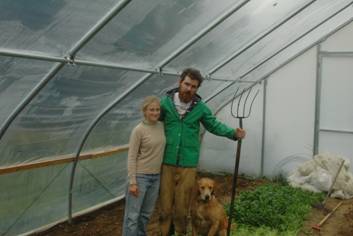
Although they’re not jet-setting around the world arguing
cases on international diplomacy or lobbying for free-trade, Brady
and Brendan’s impact is no less great. In fact, it’s
that much more focused. It’s local. Brendan confidently
states, “I am going to make a difference in my family, my town,
my friends and community. That’s what I have control
over…I don’t have control over the United Nations or
Kim IL Sung. When I read the paper I can get real depressed
but when I go to grocery store I can have a great trip, see people
I know, get some good food.”
Some tomatoes you buy in the store are picture perfect because
they are sprayed with all sorts of chemicals. Some are even
painted. Organic farmers are facing tough competition in
today’s world of airbrushing, plastic surgery and genetically-modified
food. So, organic farmers are trying to launch a campaign
that makes it clear that slightly cosmetically disfigured crops
are natural and better. After spending a day with Brady,
Brendan and Maxwell at Morning Dew Farm, there’s little doubt
which tomato I prefer.
For more information on Morning Dew Farm, kindly see www.morningdeworganic.com.
|
|
